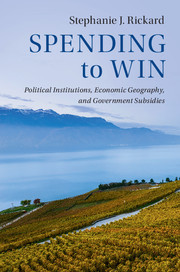Description
Spending to Win
Political Institutions, Economic Geography, and Government Subsidies
Political Economy of Institutions and Decisions Series
Author: Rickard Stephanie J.
Explores how political institutions and economic geography interact to shape governments' policy decisions, particularly with respect to subsidies.
Language: English
Subject for Spending to Win:
Approximative price 28.98 €
In Print (Delivery period: 14 days).
Add to cart
Spending to Win
Publication date: 01-2020
Support: Print on demand
Publication date: 01-2020
Support: Print on demand
Approximative price 107.81 €
In Print (Delivery period: 14 days).
Add to cart
Spending to Win
Publication date: 04-2018
260 p. · 15.7x23.5 cm · Hardback
Publication date: 04-2018
260 p. · 15.7x23.5 cm · Hardback
Description
/li>Contents
/li>Biography
/li>
Governments in some democracies target economic policies, like industrial subsidies, to small groups at the expense of many. Why do some governments redistribute more narrowly than others? Their willingness to selectively target economic benefits, like subsidies to businesses, depends on the way politicians are elected and the geographic distribution of economic activities. Based on interviews with government ministers and bureaucrats, as well as parliamentary records, industry publications, local media coverage, and new quantitative data, Spending to Win: Political Institutions, Economic Geography, and Government Subsidies demonstrates that government policy-making can be explained by the combination of electoral institutions and economic geography. Specifically, it shows how institutions interact with economic geography to influence countries' economic policies and international economic relations. Identical institutions have wide-ranging effects depending on the context in which they operate. No single institution is a panacea for issues, such as income inequality, international economic conflict, or minority representation.
Tables; Figures; Acknowledgements; 1. Who gets what and why? The politics of particularistic economic policies; 2. The uneven geographic dispersion of economic activity; 3. How institutions and geography work together to shape policy; 4. Explaining government spending on industrial subsidies; 5. The power of producers: successful demands for state aid; 6. Why institutional differences among proportional representation systems matter; 7. The policy effects of electoral competitiveness in closed-list PR; 8. Conclusion and implications; References; Index.
Stephanie J. Rickard is Associate Professor at the London School of Economics and Political Science.
© 2024 LAVOISIER S.A.S.
These books may interest you

Homeland Security Scams 53.83 €



